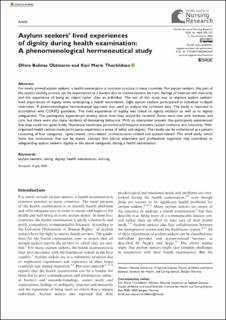| dc.contributor.author | Obtinario, Olivia | |
| dc.contributor.author | Thorkildsen, Kari Marie | |
| dc.coverage.spatial | Norway | en_US |
| dc.date.accessioned | 2021-04-07T11:17:07Z | |
| dc.date.available | 2021-04-07T11:17:07Z | |
| dc.date.created | 2020-07-16T13:02:29Z | |
| dc.date.issued | 2020 | |
| dc.identifier.citation | Obtinario, O. B., & Thorkildsen, K. M. (2020). Asylum seekers’ lived experiences of dignity during health examination: A phenomenological hermeneutical study. Nordic Journal of Nursing Research, 40(4), 205-212. | en_US |
| dc.identifier.issn | 2057-1585 | |
| dc.identifier.uri | https://hdl.handle.net/11250/2736597 | |
| dc.description.abstract | For newly arrived asylum seekers, a health examination is common practice in many countries. For asylum seekers, this part of the asylum-seeking process can be experienced as a burden due to communication barriers, feelings of mistrust and insecurity and the experience of being an object rather than an individual. The aim of this study was to explore asylum seekers’ lived experiences of dignity while undergoing a health examination. Eight asylum seekers participated in individual in-depth interviews. A phenomenological hermeneutical approach was used to analyse the collected data. The study is reported in accordance with COREQ guidelines. The lived experience of dignity was linked to dignity violation as well as to dignity safeguarded. The participants experienced anxiety about how they would be received. Some were met with kindness and care, but there were also many incidents of demeaning behaviour. With an interpreter present, the participants experienced that they could not speak freely. Numerous healthcare personnel and frequent transfers caused confusion and insecurity. Well-organised health centres made participants experience a sense of safety and respect. The results can be understood as a pattern consisting of four categories: rights-related, care-related, communication-related and system-related. This small study, which limits the conclusions that can be drawn, conveys that ethical awareness and professional expertise may contribute to safeguarding asylum seekers’ dignity in the above categories during a health examination. | en_US |
| dc.language.iso | eng | en_US |
| dc.publisher | Sage | en_US |
| dc.rights | Navngivelse 4.0 Internasjonal | * |
| dc.rights.uri | http://creativecommons.org/licenses/by/4.0/deed.no | * |
| dc.subject | asylum seekers | en_US |
| dc.subject | caring | en_US |
| dc.subject | dignity | en_US |
| dc.subject | health examination | en_US |
| dc.subject | nursing | en_US |
| dc.title | Asylum seekers lived experiences of dignity during health examination - a phenomenological hermeneutical study | en_US |
| dc.type | Peer reviewed | en_US |
| dc.type | Journal article | en_US |
| dc.description.version | publishedVersion | en_US |
| dc.rights.holder | © The Author(s) 2020 | en_US |
| dc.subject.nsi | VDP::Medisinske Fag: 700::Helsefag: 800::Sykepleievitenskap: 808 | en_US |
| dc.source.pagenumber | 205-212 | en_US |
| dc.source.volume | 40 | en_US |
| dc.source.journal | Nordic journal of nursing research | en_US |
| dc.source.issue | 5 | en_US |
| dc.identifier.doi | 10.1177/2057158520947649 | |
| dc.identifier.cristin | 1819602 | |
| cristin.ispublished | true | |
| cristin.fulltext | original | |
| cristin.qualitycode | 1 | |

